新概念英语-第二册18课
新概念英语第二册Lesson18heoftendoesthis课件

Words and phrases
5. pay the bill 付账
6. take 把…带走 bring 把…带来 fetch 去取某物(一来一去的动作)
Words and phrases
7. return v. ①come back 回来
eg: He has just returned from Australia. ②give back 归还 eg: He returned the book to the library. n. 回来,归还 in return for … 作为…的回报
Exercise
一、选词填空
beside besides except look for find look forward to
1.When the bus stopped, an old man beside me got off.
2.No one can contact the manager except
miss you.
6.I’m looking for
my glasses. I can’t find them
anywhere.
Exercise
二、单项选择
1.In order to keep fit, I B a walk after dinner everyday.
A. get
B. take
C. make D. try
A. away
B. in
C. up
D. down
Fill in the blanks 1
He often does this! After I had had lunch at a village__p_ub__, I looked for my bag. I had left it on a chair beside the door and now it wasn't there! As I was looking for it, the __la_n_d_lo_r_d__came in.”Did you have a good meal?" he asked. 'Yes, thank you,' I answered, 'but I can't pay the__b_il_l __. I haven't got my bag.'The landlord smiled and immediately went out. In a few minutes he returned with my bag and gave it back to me.'I'm very sorry,' he said. 'My dog had taken it into the garden. He often does this!'
新概念英语2第18课ppt课件
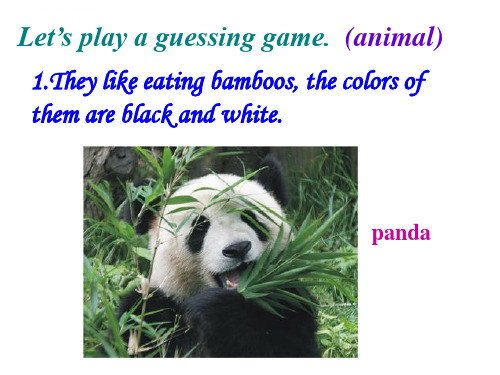
是以区(县)、乡(镇) 、村( 社区) 三级综 治中心 为指挥 平台、 以综治 信息化 为支撑 、以网 格化管 理为基 础、以 公共安 全视频 监控联 网应用 为重点 的“群 众性治 安防控 工程” 。
Today we’ll listen to a story about a woman who couldn’t find her handbag.
True or false?
1.The writer had lunch at a village pub. 2.She couldn’t find her bag after her meal . 3.She could pay the bill . 4.The landlord soon found it for her. 5.The dog had taken it into the park.
panda
“雪亮工程"是以区(县)、乡(镇) 、村( 社区) 三级综 治中心 为指挥 平台、 以综治 信息化 为支撑 、以网 格化管 理为基 础、以 公共安 全视频 监控联 网应用 为重点 的“群 众性治 安防控 工程” 。
2.They are the symbols of Australia, and they usually put their babies in the front pockets.
‘Did you have a good meal?’ he asked. ‘Yes, thank you,’ I answered, ‘but I can’t pay the bill. I haven’t got my bag.’ The landlord smiled and immediately went out. In a few minutes he returned with my bag and gave it back to me. ‘I'm very sorry,’ he said. ‘My dog had taken in into the garden. He often does this!’
新概念英语第二册课件Lesson18共15页PPT

子男)
3.bill /bil/ n. 帐单
• 1.议案;法案 • 2.纸币;钞票 • 3.广告;海报 常用搭配: foot the bill 付账;负责 pay/settle the bill 付账 fill the bill 适合
text
• 1、After I had had lunch at a village pub, I looked for my bag.
• Pub是public house(酒店,酒店) 的缩写
• Let’s go to the pub for a drink.
• 2、I had left it on a chair beside the door and now it wasn't there!
• leave除了“离去,离开,出发” 的意思,还可以表示“把(人、 物)留下,遗留,丢下”等。
还有许多其他事要做。 • beside pron. 在……旁边,在……附近 • besides adv. 而且,并且,此外;pron. 除……
之外(还)
• I’m quite busy today. Besides, I’ve got a bad cold.
• There were a lot of people at the party besides us.
Have的用法
• 1、have作为助动词构成各种完成时和完成 进行时
• 2、have还可以作完全动词,当作“具有、 拥有”讲时,它和have got通常可以互换。 have做 “有, 患病” 概念时, 可作为实义动 词, 也可作为非实义动词。在英国英语中的 疑问句和否定句中have(具有)的用法与 be相同,即可以不用助动词do或did;在美 国英语中,常用do助动词和have一起构成 疑问句和否定句。
新概念英语第二册Lesson18课件

give A back to B 上交,交给
捐赠,赠送
2024/5/30
屈服,投降 放弃 投降
give 的短语动词
2024/5/30
在…旁边
除…之外(还有…)
A besides B 除了B,还有A B+A
except A except B 从A中除去B
A-B
2024/5/30
表示“除了”的词
Lesson 18 He often does this
酒吧,酒馆
贵族,大臣,领主,勋爵 土地
业主,房东
You must pay the telephone bill. The bill will become law next year. 议案,法案 Please bill me for the books. (v.)开账单
give A back to B 把A还给B return A to B take
2024/5/30
1. have(has/had) 在完成时中做助动词 I have already had lunch. She had cleaned the room before we came home.
2024/5/30
2024/5/30
Hale Waihona Puke 2. have可以表示“有,拥有” 此时它是一个实义动词 可以和own, possess, have got进行替换 要注意have got表示“拥有”时,其中的have相当于助动词
2024/5/30
2024/5/30
洗(澡) 吃
玩得开心 收到
3. have加名词或者名词短语 表示进行和从事与这个名词相关的事情 具体意思根据名词来翻译 have a smoke
新概念二 第18课课件

课文注释
beside与besides
介词beside常用的含义为“在……旁边”、“在……附近”: Come and sit beside us.过来坐在我们旁边吧。 There is a chair beside the door.门旁边有一把椅子。 besides的词形与beside很相似,但意义却相差甚远。 besides作副词时表示“而且”、“并且”、“此外”等意思:
完全动词have
在其他时态中,一般用have而不用 have got He had a Ford last year.去年他有过一辆福特牌汽车。 I have had this car for three years.这辆汽车我已用了3年了。 Last week, Jimmy had a bad cold上星期吉米得了重感冒。 (3)have作完全动词时,还可以表示eat,drink,enjoy,take等意思,这时它是行为动词,可以 用于包括进行时的各种时态: Have a cigarette, Sam.萨姆,请抽烟。 We will have dinner at seven o'clock.我们将于7点开饭。 Sam and I had lunch together today.我和萨姆今天一起吃的午饭。 I'm having a drink.我正在喝点东西。
除了我们以外,晚会上还有许多(其他)人。
课文注释
3. Mydoa had taken it into the garden. He often does this! 我的狗把它弄到花园里去了,他常干这种事! he在这里指代的是狗。动物通常用it来代表,即被看成像东西一样。但是,指宠物、家畜或民间 故事中的动物时,我们经常也用he,she,who等,即使得它们“人格化”并具有性别。用阴性代词指 某个动物或东西时尤其有一种亲切的含义: have a little cat. She drinks milk every morning 我有一只小猫。她每天早上喝牛奶。
新概念英语第二册第18课
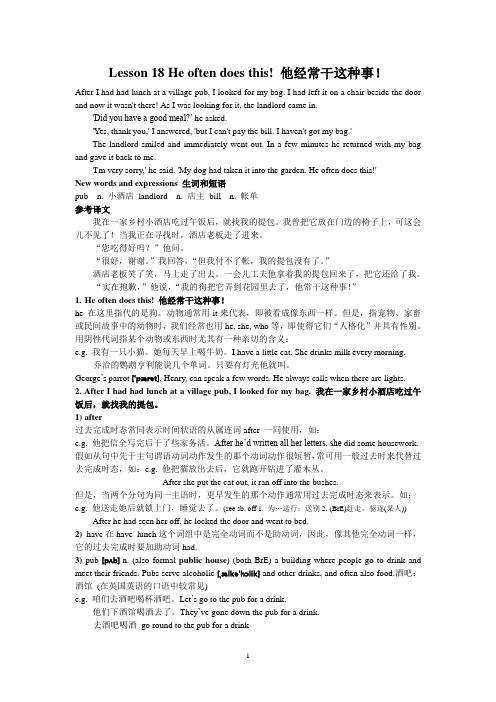
Lesson 18 He often does this! 他经常干这种事!After I had had lunch at a village pub, I looked for my bag. I had left it on a chair beside the door and now it wasn't there! As I was looking for it, the landlord came in.'Did you have a good meal?’ he asked.'Yes, thank you,' I answered, 'but I can't pay the bill. I haven't got my bag.'The landlord smiled and immediately went out. In a few minutes he returned with my bag and gave it back to me.'I'm very sorry,' he said. 'My dog had taken it into the garden. He often does this!'New words and expressions 生词和短语pub n. 小酒店landlord n. 店主bill n. 帐单参考译文我在一家乡村小酒店吃过午饭后,就找我的提包。
我曾把它放在门边的椅子上,可这会儿不见了!当我正在寻找时,酒店老板走了进来。
“您吃得好吗?”他问。
“很好,谢谢。
”我回答,“但我付不了帐,我的提包没有了。
”酒店老板笑了笑,马上走了出去。
一会儿工夫他拿着我的提包回来了,把它还给了我。
“实在抱歉,”他说,“我的狗把它弄到花园里去了,他常干这种事!”1.He often does this! 他经常干这种事!he 在这里指代的是狗。
新概念第二册Lesson 18 He often does this

2、I had left it on a chair beside the door and now it wasn't there?
→e.g.: He left a note on the door .
→e.g.: I think I must have left the key in the room. beside/ besides/ except beside 在...旁边 beside the door/ window / car /lake besides (除了...外包括)包括... He can speak many languages besides English except 除了... Every student came to the party except Tom.
3、What had happened to your handbag?
Questions on the text
1、Where did you leave her handbag? She left her handbag on the chair beside the door. 2、Why couldn't you pay the bill ?
look for
&
find
→I was looking for the map for half an hour and finnally I found it. look for find 找的动作 找的结果
Yesterday I was my lost keys, but I have not them now.
Let’s play a guessing game.(animal) 1.It runs very fast, people used it as a traffic tool In the old days.
新概念英语第二册lesson18精品PPT课件
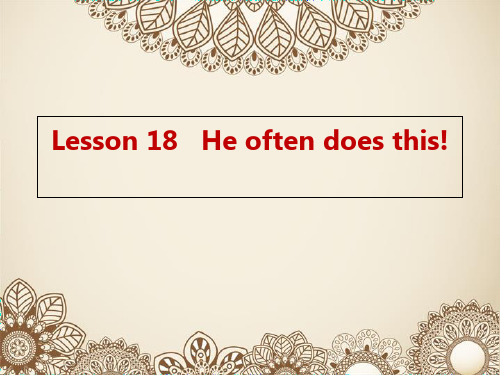
住客栈
2 landlord
(1)主人, 房东(旅馆,家庭,公寓)
(2)地主
lord n . 统治者,主人,贵族,勋爵
Lord! 天啊!哎呀!哎哟! as drunk as a lord 酩酊大醉
landlady 女主人;
3 Bill 1) n. 账单,纸币 (note)
2) n. 招贴,广告,海报
1) n. 账单,纸币 (note) pay the bill/settle the bill
付账
It’s wrong to leave a hotel without paying all your bills. 没有付账离开旅馆是不对的。
新概念第二册Lesson 18

助动词
动词
村庄
酒馆
寻找
After I had had lunch at a village pub, I looked for my bag.
I had left it on a chair beside the door and now it wasn't there!
没有
haven't got my bag. ’
一些
The landlord smiled and immediately went otes he returned with my bag and gave it back to me.
‘I'm very sorry, ’he said. ‘My dog had taken it into the
Tim has got two sisters. =Tim has two sisters.
The house hasn’t got a garden.
The house doesn’t have a garden.
1. Sarah hasn’t got / doesn’t have a car. She goes everywhere by bicycle. 2. Charles isn’t happy. He has got / has a lot of problems. 3. ‘Where’s my pen?’’I don’t know. I haven’t got/don’t have it.’
a few 修饰可数名词复数,一些,有点 few 修饰可数名词复数,否定,几乎没有 a little 修饰不可数名词 little 修饰不可数名词,否定 a lot of=losts of 修饰不可数名词&可数名次复数,相当于many/much plenty of 修饰不可数名词&可数名词复数,足够的,大量的,比a lot of 多 1.There was little food in the fridge. It was nearly empty. 2.Can I have a little milk in my coffee,please?
新概念英语第二册第18课
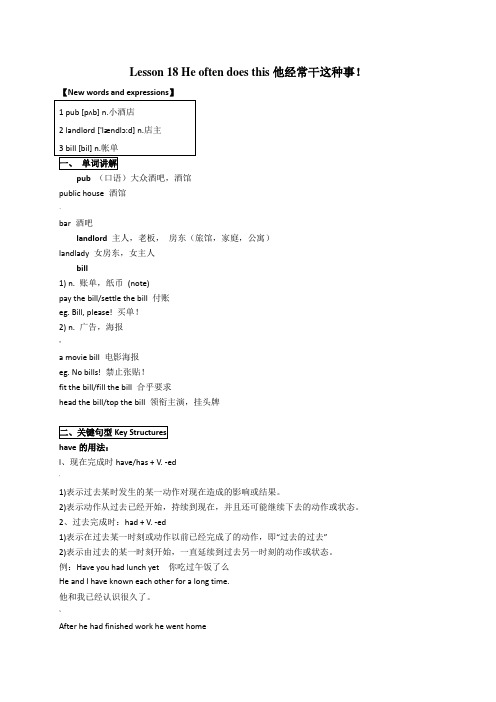
Lesson 18 He often does this他经常干这种事!【New words and expressions】1 pub [pʌb] n.小酒店2 landlord ['lændlɔ:d] n.店主3 bill [bil] n.帐单一、单词讲解pub(口语)大众酒吧,酒馆public house 酒馆、bar 酒吧landlord主人,老板,房东(旅馆,家庭,公寓)landlady 女房东,女主人bill1) n. 账单,纸币(note)pay the bill/settle the bill 付账eg. Bill, please! 买单!2) n. 广告,海报*a movie bill 电影海报eg. No bills! 禁止张贴!fit the bill/fill the bill 合乎要求head the bill/top the bill 领衔主演,挂头牌二、关键句型Key Structureshave的用法:l、现在完成时have/has + V. -ed'1)表示过去某时发生的某一动作对现在造成的影响或结果。
2)表示动作从过去已经开始,持续到现在,并且还可能继续下去的动作或状态。
2、过去完成时:had + V. -ed1)表示在过去某一时刻或动作以前已经完成了的动作,即“过去的过去”2)表示由过去的某一时刻开始,一直延续到过去另一时刻的动作或状态。
例:Have you had lunch yet 你吃过午饭了么He and I have known each other for a long time.他和我已经认识很久了。
~After he had finished work he went home他完成工作后回家了。
We had been waitiing for an hour when he showed up.他出现时,我们己经等了一个小时了。
新概念二第18课课件ppt

目录
• 课文讲解 • 练习与巩固 • 扩展与提高 • 课堂互动 • 总结与回顾
CHAPTER 01
课文讲解
词汇学习
总结词:重要词汇
详细描述:本课涉及的词汇包括“postcard”(明信片)、“envelope”(信 封)、“stamp”(邮票)等,这些词汇是日常生活中常用的,对于提高英语实 际应用能力非常重要。
话题讨论
设计与课文主题相关的话题,让学生 进行讨论或辩论,提高口语表达的逻 辑性和条理性。
写作练习
仿写练习
让学生仿写课文中的句子或段落,注重语法和词汇的准确运 用,以提高写作的基本功。
主题写作
设计与课文主题相关的写作任务,让学生进行创作,提高写 作的创意和表达能力。
CHAPTER 04
课堂互动
小组讨论
详细描述
在游戏互动中,学生通过参与各种游戏来学 习课程内容。这种方式能够让学生在轻松愉 快的氛围中学习知识,提高学习效果。同时 ,游戏互动还能够培养学生的团队协作和竞 争意识,增强学生的综合素质。
CHAPTER 05
总结与回顾
本课重点回顾
01
02
03
04Βιβλιοθήκη 掌握一般现在时的用法,了解 其与一般过去时的区别。
VS
详细描述
在角色扮演中,学生根据课程内容扮演不 同的角色,通过模拟场景来展示课程内容 。这种方式能够增强学生的参与感和体验 感,帮助学生更好地理解课程内容,提高 学习效果。同时,角色扮演还能够培养学 生的表演和表达能力,增强学生的综合素 质。
游戏互动
总结词
游戏互动是一种寓教于乐的课堂互动方式, 能够激发学生的学习兴趣和积极性。
CHAPTER 03
新概念第二册Lesson 18知识要点总结

新概念第二册Lesson 18复习要点一.L18词汇讲解:1.pub 小酒店bar 酒吧book bar 书吧/tea bar 茶吧/ internet bar 网吧ndlord 店主land 土地lord 领主Lord of Ring 指环王3.bill 账单pay the bill 付账Bill,please./Check, please.结账。
二.重难点:1.have got/has got 有/得了某种疾病,当have 或者has 的意思是“有,得病”的使用,可以互换2.give up 放弃,投降give in 投降/上交give away 送人区分give in 和give up 的不同:The soldiers lost the battle but they didn’t give themselves up . 士兵们输掉了战斗,但是他们没有投降。
The soldiers didn’t give in.士兵们没有投降。
3.a village pun 村庄的小酒馆an apple tree 一棵苹果树a woman doctor 一位女医生注意:two apple trees /two women doctors4.look for 强调动作或者过程find强调结果类比:look at/see listen to/hear put on/wear。
5.leave sb. sth/leave sth. for sb.给某人留下某物6.return的含义返回:He’ll return to his country in 2 years.他两年之后会回来。
返还,偿还:I’ll return your money soon.我会很快还你的钱。
7.几个“除......之外”的词和短语:besides/except/apart from/except fromapart from和except for 可用于句首。
新概念英语第二册第18课ppt课件

采用PP管及配件:根据给水设计图配 置好PP管及配 件,用 管件在 管材垂 直角切 断管材 ,边剪 边旋转 ,以保 证切口 面的圆 度,保 持熔接 部位干 净无污 物
• The landlord smiled and immediately went out. In a few minutes he returned with my bag and gave it back to me. 'I'm very sorry,' he said ' My dog had taken it into the garden. He often does this.'
• beside (prep.) = next to
• As I was looking for it, the landlord 采用PP管及配件:根据给水设计图配置好PP管及配件,用管件在管材垂直角切断管材,边剪边旋转,以保证切口面的圆度,保持熔接部位干净无污物 came in.
• as = when = while 当…时候 • 过去进行时:was ∕were + doing • come in = enter • 'Did you have a good meal ?' he
asked. • have a good meal
'Yes, thank you,' I answered,
'but I can't pay the bill. 采用PP管及配件:根据给水设计图配置好PP管及配件,用管件在管材垂直角切断管材,边剪边旋转,以保证切口面的圆度,保持熔接部位干净无污物 pay the bill I haven't got my bag.‘ have = have got = own = possess • The landlord smiled and immediately went out. • Immediately • = at once = right now = right away • = in no time = in a minute
新概念英语第二册18课ppt课件
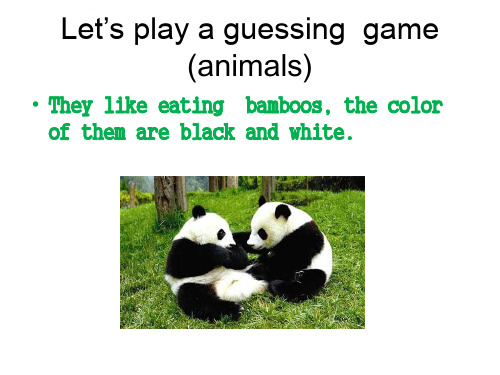
经营者提供商品或者服务有欺诈行为 的,应 当按照 消费者 的要求 增加赔 偿其受 到的损 失,增 加赔偿 的金额 为消费 者购买 商品的 价款或 接受服 务的费 用
现在完成时
• ①现在完成时 表示过去某时发生的某一动作对现在造 成影响或者是结果 I have finished reading the book .我已经读完这本书了。
过去完成时态
• ①过去完成时态表示在过去某一时刻或者动作以前已经完 成。即过去的过去。
我昨天已经完成我的作业了。 I had finished my homework yesterday . ②表示由过去的某一时刻开始,一直延续到过去另一时刻的
动作或者状态。 After he came back ,I had lived in Xiamen for 2 years .
give in =hand in 上交 投降 Though the problem is hard but I won’t give in.
give up give up smoking Do the exercise in page 82.
经营者提供商品或者服务有欺诈行为 的,应 当按照 消费者 的要求 增加赔 偿其受 到的损 失,增 加赔偿 的金额 为消费 者购买 商品的 价款或 接受服 务的费 用
• 'Did you have a good meal?" he asked. • 'Yes, thank you,' I answered, 'but I can't pay the
bill. I haven't got my bag.' • The landlord smiled and immediately went out.
新概念英语第二册18课ppt课件
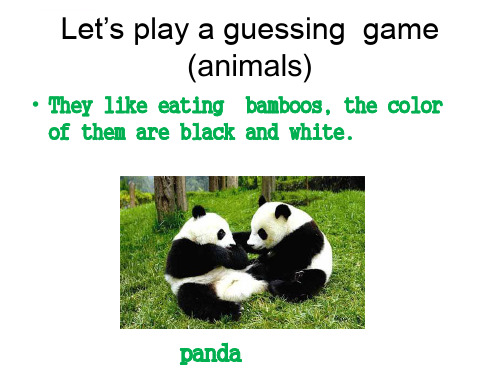
“雪亮工程"是以区(县)、乡(镇) 、村( 社区) 三级综 治中心 为指挥 平台、 以综治 信息化 为支撑 、以网 格化管 理为基 础、以 公共安 全视频 监控联 网应用 为重点 的“群 众性治 安防控 工程” 。
“雪亮工程"是以区(县)、乡(镇) 、村( 社区) 三级综 治中心 为指挥 平台、 以综治 信息化 为支撑 、以网 格化管 理为基 础、以 公共安 全视频 监控联 网应用 为重点 的“群 众性治 安防控 工程” 。
giraffe
“雪亮工程"是以区(县)、乡(镇) 、村( 社区) 三级综 治中心 为指挥 平台、 以综治 信息化 为支撑 、以网 格化管 理为基 础、以 公共安 全视频 监控联 网应用 为重点 的“群 众性治 安防控 工程” 。
Lesson18 He often does this!
“雪亮工程"是以区(县)、乡(镇) 、村( 社区) 三级综 治中心 为指挥 平台、 以综治 信息化 为支撑 、以网 格化管 理为基 础、以 公共安 全视频 监控联 网应用 为重点 的“群 众性治 安防控 工程” 。
“雪亮工程"是以区(县)、乡(镇) 、村( 社区) 三级综 治中心 为指挥 平台、 以综治 信息化 为支撑 、以网 格化管 理为基 础、以 公共安 全视频 监控联 网应用 为重点 的“群 众性治 安防控 工程” 。
ssing
game
(animals)
• They like eating bamboos, the color of them are black and white.
The dog had taken it into the garden.
“雪亮工程"是以区(县)、乡(镇) 、村( 社区) 三级综 治中心 为指挥 平台、 以综治 信息化 为支撑 、以网 格化管 理为基 础、以 公共安 全视频 监控联 网应用 为重点 的“群 众性治 安防控 工程” 。
新概念英语第二册课件Lesson18

have a cup of tea 5.组成复合结构即“have+宾语+宾语补足语”
You'd better give up smoking. 放弃 give away the prizes 颁发 give the secret away 泄露 出卖,赠送
give in give off give out
The strikers wouldn't give in.投降,屈服 The flower gives off a good smell.发出(光,味道等等)
A. on
B. at
C. in
D. during
5. My grandfather was born ____ Oct. 10, 1935.
A. on
B. in
C. at
D. of
6. The train is starting ___ five minutes.
A. in
B. at
C. for
D. still
表示延续时间的介词 他已经当老师9年了。 He has been a teacher __f_o_r_ nine years.
我已经在这儿住了10年了。 I have lived here _s_in_c_e_ ten years ago.
---No. We can have a game of table tennis.
A. on
B. in
C. out
新概念英语第二册Lesson18课件

Let’s watch a short video and find out how the dog is.
Listening Studio
ThWe lahnadtlohrda’d hs daopgpheandetdakteon tthheebwagriitnetro’thes gbaardge?n.
leave还可以作名词,表示“休假,假期”。 My best friend, Joan is spending her leave in Hawaii. 我最好的朋友琼正在夏威夷度假。
I had left it on a chair beside the door and now it wasn’t there!
I had left it on a chair beside the door and now it wasn’t there!
leave的用法
v. 离开(某处) Mr. Smith left the room at two o’clock. 史密斯先生两点离开房间的 。v. 留下;丢下;落下(常表示事物落在/忘在某处) Better take off your shoes and leave them outside. 最好把鞋子脱掉,放在外面。 v. 留给;交给(一般与介词with或to搭配) We didn’t find him and left word with his neighbour. 我们没有找到他,于是留了口信给他的邻居。
Reading Land
Read and learn.
After I had had my lunch at a village pub, I looked for my bag. I had left it on a chair beside the door and now it wasn’t there! As I was looking for it, the landlord came in.‘Did you have a good meal?’ he asked.‘Yes, thank you,’ I answered, ‘but I can’t pay the bill. I haven’t got my bag.’The landlord smiled and immediately went out. In a few minutes he returned with my bag and gave it back to me.‘I’m very sorry,’ he said. ‘My dog had taken it into the garden. He often does this!’
新概念英语第2册课件Lesson18(共18页)

• 4、In a few minutes he returned with my bag.
• →He arrived with bad news. • →He went out with an umbrella.
• My dog had taken it into the garden.
• He often does this!
came in.
• A.Because B.While C.But D.Even of
—
• 6、I haven't got a bag.I don't ____one.
• A.get B. buy C.own D.owe
• 7、My dog had taken it into the garden. It was ___ the garden.
back
Questions on the text
• 1、Where did the writer leave her handbag?
She left her handbag on the chair beside the door.
• 2、Why couldn't she pay the bill ?
The dog
She
cat
Key structures and usage.
• ※Have you got a dictionary?
‖
• Do you have a dictionary?
• ※I've got something to tell you.
•
‖
• I have something to tell you.
• A.to B. into C.at D.in
- 1、下载文档前请自行甄别文档内容的完整性,平台不提供额外的编辑、内容补充、找答案等附加服务。
- 2、"仅部分预览"的文档,不可在线预览部分如存在完整性等问题,可反馈申请退款(可完整预览的文档不适用该条件!)。
- 3、如文档侵犯您的权益,请联系客服反馈,我们会尽快为您处理(人工客服工作时间:9:00-18:30)。
合并句子:
1 . (After) She wrote the letter. She went to the post office. After she had written the letter, she went to the post office.
2. (After) He had dinner. He went to the cinema. After he had had dinner, he went to the cinema.
phone call.
• 7. Tom s_a_i_d__ (say) he _ha_d__re_a_d_ (read) the book twice.
• 8.He said he _h_a_d__already_g_iv_e_n(give) the book to the teacher.
•
6、酒店老板笑了笑,马上走了出去。 The landlord smiled and immediately went out.
7、一会儿工夫他拿着我的提包回来了,把它还给了我。
In a few minutes he returned with my bag and gave it back to me.
3. (When) I fastened my seat belt. The plane took off. When I had fastened my seat belt, the plane took off.
4 . We did not disturb him.( until) He finished work. We did not disturb him until he had finished work.
Let’s play a guessing game (animals)
• They like eating bamboos, the color of them are black and white.
panda
• They are the symbols of Australia , and they usually put their babies in front of the pocket.
5 . (As soon as) He left the room. I turned on the radio. As soon as he had left the room, I turned on the radio.
6 . He was very ill. (before) He died. He had been very ill before he died.
持续下去。 I have lived here for two years .我已经住在这里2年了。
had +过去分词
表示过去的时间或动作之前发生的动作,先发生的动作用过去完成时,后发生 的动作用一般过去时。
After he had finished his work, he went out.
过去分词的构成:
kangaroo
I have a very long neck and legs.I can eat the leaves on top of the tree.
giraffe
lord
village pub 乡村小酒店
• bill
①账单、纸币 • pay the bill =settle the bill 付账
(arrive).
• 5. Ih_a_d_t_u_rn_e_d off (turn off) all the lights before I w__en_t__ (go) to bed.
• 6. Paul _w_e_n_t (go) out with Jane after heh_a_d_m__ad(me ake) a
3. 过去完成时和 already, just, ever, yet 等连用表示过去的过 去。
例如:1. 他告诉我说他们队已经赢了。 He told me that his team _h_a_d______ already __w_o_n_______ (win).
2. 她说她仍没去过长城。 She said that she __h_a_d_n_’t__b_e_e_n_t_o__(not go to) the Great Wall yet.
When I came to GZ , he h_a_d__b_e_e_n______(be) there for a long time.
3.到上个月中旬我们在北京住了有五年时间了。
By the middle of last month we __h__a_d_l_iv_e_d_____(live) in Beijing for five years.
study ----- studied carry ----- carried
d) 以重读闭音节结尾的,前面有单个元音字母时, 双写辅音字母,再加 ed
stop ---- stopped drop ------- dropped
过去分词的构成:
2. 不规则动词的变化
1) AAA 2) ABA
put-put-put read-read-read come-came-come run-ran-run
1.他说他以前见过你。
He said that he ___h_a_d__s_e_e_n____ (see) you before.
2. 到六点钟为止他们已经工作八小时了。
By six o’clock they ______________(work) for
eight hours.
had worked
• landlord 店主
1、Where did the writer leave her handbag?
On a chair beside the door.
2、Why couldn’t she pay the bill?
Because her bag wasn’t there.
3、What had happened to her handbag?
1. 规则动词的变化:
a) 一般情况下在动词后面加 ed work ------ worked play -------- played
b) 以 e 结尾的动词直接加 d
use ------ used
refuse ------ refused
c) 以辅音字母加 y 结尾ቤተ መጻሕፍቲ ባይዱ动词,把 y 改 i 再加 ed
2. 过去完成时词可以表示过去某一 时刻之前发生的动作或呈现的状态, 这一动作一直持续 或将继续下去。
1. 到了六点钟为止,他们已经工作了八小时了。
By six o’clock theyh_a_d_w__o_rk_e_d____ (work)for eight hours.
2. 我到广州时,他在那里很长时间了。
become-became-become
3) ABB 4) ABC
sit-sat-sat say-said-said sing-sang-sung
drink-drank-drunk
take-took-taken
构成:助动词had + 动词的过去 分词(V.pp)
在强调过去某一个动作发生在另一个动作前常常用 过去完成时态。
• 用动词的适当形式填空
• 1. Weh_a_d_p_a_in_t_ed(paint) the house before we _m_o_v_e_d___ (move)
in.
• 2. That rich old man h_a_d_m__ad(me ake) a will before he_d_i_e_d__
8、“实在抱歉,”他说,“我的狗把它弄到花园里去 了,他常干这种事!”
'I'm very sorry,' he said. 'My dog had taken in into the garden. He often does this!'
现在完成时:have/has +过去分词
①表示过去某时发生的某一动作对现在造成的影响或结果。 I have finished reading the book .我已经读完这本书了。 I have had supper . Have you had supper ? ② 表示动作从过去已经开始持续到现在,并且还有可能继续
2. 他说他以前见过你。 He said that he _h_a_d_s_e_e_n_____(see) you 3b. e当fo我re进. 来时,他已做完了作业。 When I came in he _h_a_d__fi_n_i_s_h_e_d_____(finish) his homework.
(die).
• 3. Theyhad_st_u_di(esdtudy) the map of the country before they
•
_l_e_ft_ (leave). 4. The robbers
h_a_d_r_u_n(aruwnayaway
)
before
the
policemena_r_ri_ve_d
过去完成时与when, before, as soon as, till/ until 等引导时间状语的从句连 用,强调动作发生的时间前后。
例如:1. 她到家之前她的孩子已经睡着了。 When she got home her children ___h_a_d_s_l_e_p_t__(sleep). 2. 在他们到达之前电影已经开始了。
Before they arrived here the film _h_a_d______ already ___s_ta_r_te_d____ (start).
